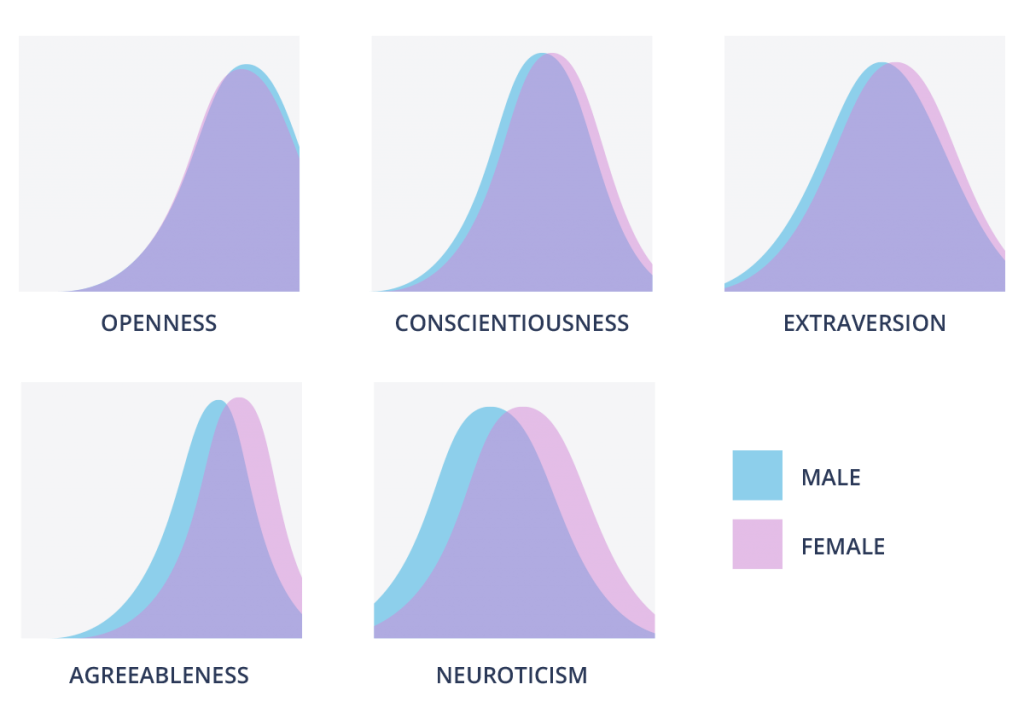The Big Five personality theory
What is a personality test?
A personality test or a character test is a tool used to assess someone’s personality traits. A personality test helps to find the answers to questions such as: What makes you who you are? An excellent psychological personality test obtains information about a person’s motivation, preferences, interests, emotional stability, and interactions with other people and situations. Someone can take a personality test by writing, online, or through an interview.
What is personality?
The word personality identifies itself from the Latin word ‘persona.’ Personality is a combination of characteristics that define a person. All the qualities of a person make that person different from others. One person may have a cheerful personality, another a more serious personality. A person can be introverted, extroverted, or just in between.
Personality is a term that describes traits that a person consistently exhibits at different times and in different situations. Understanding a personality or character allows one to explain and understand behavior. A person’s character is part of what constitutes that person as a human being.

Factors such as interests, trauma, environment, and upbringing play an essential role in shaping someone as a person.
What theory is the Big Five personality test based on?
The Big Five personality theory measures (as the name suggests) five personality traits. For each trait, you can score high, low, or somewhere in between. Each of the five traits is a dimension where the spectrum extends within two opposite extremes.
- Openness to experience vs. closedness or conventionality
- Conscientiousness (meticulousness) vs. disorganized
- Extravert vs. Introvert
- Altruism (kindness) vs. Egoism
- Neuroticism (emotional instability) vs. emotional stability
Decades of worldwide research have shown that personalities can be predicted. These studies have formed the Big Five personality test and are often used in academic psychological personality research.
The Big Five personality theory is accepted among psychologists worldwide as the most significant personality theory of its kind.
Scores Big Five
The Big Five personality test can be classified into a low, medium, or high score for each character trait.
Description by character trait
Openness (open to new experiences)
Openness indicates how open-minded someone is. Openness shows how someone thinks and reacts to problems and challenges. It indicates whether someone likes variety in their daily life. It also shows the need for innovation and independence.
People with a high level of openness are imaginative. They are full of new ideas. They are flexible and curious about unique experiences or unusual ideas. People with a lower score for openness like structure, routine, and avoid unfamiliar situations.
These words are appropriate for openness: inventive, intellectual, curious, adventurous, rebellious.
Conscientiousness (thoughtfulness)
Conscientiousness indicates the degree of diligence of a person. This personality trait describes the degree of organization skills and responsibility. It indicates to what extent someone is focused on the result. This trait is characterized by the urge to do a task well and to take obligations towards others very seriously. That is why conscientious people are often leaders. They can take management positions within a company.
People with a low conscientiousness score are more likely to procrastinate. They can also be a little sloppy and tend to make impulsive decisions.
These words fit conscientiousness: organized, mindful of details, careful, orderly, structural, and perfectionist.
Extraversion (focus on the outside world)
Extraversion indicates the degree to which someone is focused on the outside world. Extroverts prefer to be with other people than being alone. Extraversion refers to the need for social incentives, and it indicates the extent to which people look for action. Extroverts are spontaneous and prefer variety in many situations.
The opposite of extraversion is introversion. Introverted people tend to be a bit calmer and reserved. They like to work alone and have less need for social contact than extroverts.
Words that suit extroversion: social, spontaneous, energetic, optimistic, temperamental, and impulsive.
Agreeableness (friendliness)
Agreeableness is a personality trait that indicates the degree of friendliness. It shows how people position themselves concerning others. People who score high on this characteristic adapt their behavior to others. They ignore themselves, which usually makes them appear warm, willing, and friendly. They get along well with others.
People who score low on this characteristic place themselves above the other. This can often make them appear competitive, gruff, and bossy.
Words that suit agreeableness: warm, sympathetic, helpful, hospitable, compassionate, cooperative, and unselfish.
Neuroticism (emotional instability)
Neuroticism indicates the emotional instability of a person. It indicates the degree to which stress factors influence a person. People who score high on neuroticism quickly become angry or worry more easily. People who score low on this trait are emotionally instable and, therefore, more relaxed. They feel less of the impact of negativity and deal with it better.
Words that fit neuroticism: anxious, unconscious, frustrated, worried, self-critical, unstable.
Neuroticism (emotional instability)
indicates the emotional instability of a person. It indicates the degree to which stress factors influence a person. People who score high on neuroticism quickly become angry or worry more easily.
People who score low on this trait are emotionally instable and, therefore, more relaxed. They feel less of the impact of negativity and deal with it better.
Words that fit neuroticism: anxious, unconscious, frustrated, worried, self-critical, unstable.
The history of the Big Five Theorie
Unlike many other personality theories, the Big Five did not emerge from an individual psychologist’s view. Several researchers who tackled mapping personality traits found that the differences between people seemed to sort themselves into five broad dimensions naturally.
At the end of the 19th century, Francis Galton (a British psychologist) used a dictionary to create an inventory of all the words used to describe a person’s character, intending to develop a theory of personality traits.
His work was picked up in the 1930s by psychometrist Louis Leon Thurstone (American psychologist), who provided subjects with a list of 60 adjectives and asked them to rate a person close to them based on how well each adjective described them. Thurstone then applied the method of factor analysis to analyze how the adjectives were related and grouped them into five groups, which corresponded to the Big Five personality factors.
Later work by American psychologists Gordon Allport and Henry Odbert expanded the classification of adjectives to include every possible word used to describe a person. Evidence of this theory continued to grow for many years, with studies by American psychologist Donald W. Fiske (1949) and later expanded by other researchers, including Warren T. Norman (1967), Smith (1967), Lewis Goldberg (1981), and McCrae & Costa (1987). Dutch researchers such as Wim Hofstee and Boele de Raad have also translated their research and findings around the Big Five theory.
The Origins Personality Tests
The Origins personality test gives you a detailed insight into a person’s personality and is based on the Big Five personality theory. The reason Origins has chosen this method is because this theory is the most used and scientifically researched personality theory worldwide. The Origins personality test has very high reliability with high validity and uses a recently analyzed norm group.
Data & Charts
This chart visualizes data from the Origins app. Data visualization of the five character traits for men and women. From this chart, you can deduce that, on average, women score higher on altruism and neuroticism than men.

Origins offers two types of personality tests
The Origins Basic 20 questions test (free). This test is a simplified and shortened variant (with a more global indication score per character trait) of the comprehensive Origins Pro 120 questions (paid) test. The free variant asks 20 questions, which means that only four questions will be asked per personality trait. An extensive and very accurate report can be obtained with the comprehensive personality test. The Origins Pro test answers 120 questions, which makes the scores per personality trait much more specific.
A test score by itself does not say much until the score will be compared to a comparison group’s scores. The free Origins Basic 20 report compares scores with men and women of all ages, making the score a rough estimate. The paid Origins Pro 120 personality test makes the analysis more valuable by comparing scores to one’s own comparison group (gender and age range), allowing for a very accurate score estimate.
Scoring model
For each question, people can indicate how much they agree on a scale of 1-5.
1 = Disagree strongly
2 = Disagree a little
3 = Neither agree nor disagree
4 = Agree a little
5 = Agree strongly
Would you like more information about this subject?
Do you have a question for us or do you want to know more about us? Please feel free to contact us.
